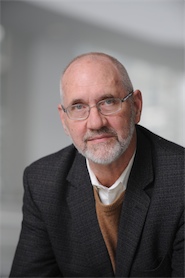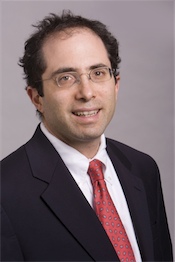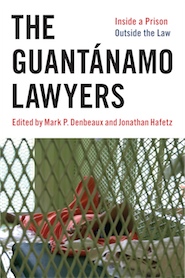Seton Hall Law Professor Mark Denbeaux and Jonathan Hafetz of the ACLU are two of the leading members of the “Guantánamo Bar Association”—the group of private and military lawyers who have managed the defense of the dwindling number of prisoners at Gitmo. They have brought out The Guantánamo Lawyers, a collection of over one hundred personal narratives by lawyers involved in this high-profile matter. I put six questions to them about the book and the status of the pending litigation over Gitmo.
1. On his second day in office, President Obama made a commitment to close Gitmo within a year. How does the Gitmo defense bar see his performance on that undertaking?

denbeaux: President Obama’s pronouncement on his second day in office that he would close Guantánamo within a year seemed to signal a new direction. It was an important and symbolic statement. Part of the symbolism came from the simplicity of the promise. Unfortunately, the simplicity was misplaced. The problems were not simple. The efforts were too slow and the steps too small because underlying issues were not addressed. There have been some positive steps towards restoring the rule of law, such as the ban on harsh interrogation methods and the recent decision to bring those accused of responsibility for the 9/11 attacks to trial in federal court. Also, some detainees have reported that treatment and conditions improved in modest ways almost immediately after President Obama took office. But his administration also has not broken with some failed and unconstitutional policies of the past. It has revived military commissions and decided to detain some prisoners without trial. The concern is that even if the Guantánamo prison is one day shut down, the Guantánamo system lives on.
2. Last Friday, Attorney General Eric Holder announced that a number of cases would be referred for trial in the federal court in Manhattan, while others would go forward before the military commission. Do you see a pattern here that will inform the rest of the cases? What do you make of his decision to continue with cases before the military commissions?

hafetz: Holder’s announcement that five individuals allegedly responsible for the 9/11 attacks, including Khaled Sheikh Mohammed, would be brought to trial in federal court takes an important—if long overdue—step towards restoring the rule of law. The decision is a show of faith in the U.S. criminal justice system, which has shown repeatedly that it can preserve fundamental constitutional rights while protecting legitimate national security concerns. At the same time, the administration’s decision to continue prosecuting terrorism suspects in military commissions is regrettable. Although the commissions have been significantly improved, they still suffer from various flaws, violate principles of equal protection under law by applying only to non-citizens, and lack the credibility and proven track record that federal courts have.
3. From the Holder announcement, it almost looks like cases go to the commissions because prosecutors don’t have evidence that would pass muster in a federal court. Is that right? Can you discern any rule that governs which cases go to the commissions versus which go to the federal courts?
Three weeks before I got to Guantánamo, Vice President Cheney said, “the people that are there are people we picked up on the battlefield, primarily in Afghanistan. They’re terrorists. They’re bomb makers. They’re facilitators of terror. They’re members of al Qaeda and the Taliban.” … On that day last July, I discovered what President Bush and his lawyers at the Justice Department had kept secret from the public, and even from the court: the military had concluded that Adel was innocent. Not a terrorist. Not an enemy soldier. Not a criminal. Never been on a battlefield. He’d been sold to U.S. forces from the soil of Pakistan, a nation with which we’d never been at war.
Vice President Cheney says that Adel and men like him were picked up on the battlefield, but according to a 2005 study conducted by Seton Hall School of Law, five percent were picked up on the battlefield. Ninety-five percent were not.
—From The Guantánamo Lawyers: Inside a Prison Outside the Law
Reprinted by permission of the publisher, New York University Press. Copyright © 2009 New York University
hafetz: The administration has failed to provide a coherent explanation of why one prisoner gets full due process in a civilian criminal trial while another receives due process lite in a jerry-rigged military commission. The absence of any clear or valid principle behind this sorting process suggests a troubling arbitrariness. It gives rise to the possibility that the U.S. government will simply deviate from trying terrorism cases in federal courts where it lacks the evidence to convict or faces other legal obstacles. And even if this were not the reason (or the only reason) for using military commissions, it will inevitably be the perception of America’s two-tiered system of justice. This type of forum-shopping undermines the integrity of both our civilian and military justice systems.
4. Your book contains some surprising nuggets. The chapter “Karma Sutra” recounts one lawyer’s unusual way of winning his client’s confidence.
denbeaux: The goal of the book was to provide an inside account of Guantánamo, the detainees, and the struggle for justice. Our fear was that many of these stories would be lost if they were not captured, and the truth about Guantánamo might be lost to history. With the detainees effectively silenced by the U.S. government for so many years, it fell to their lawyers to speak out. In the book, the lawyers bear witness, as primary observers, to the dehumanization, the arbitrariness, and the despair that lies behind Guantánamo. The book also contains, however, some moments of humor and of hope.
“Karma Sutra” reveals the unusual lengths that lawyers had to be willing to go to in order to develop attorney-client relationships with their detainee-clients. All had to overcome unprecedented barriers, and sometimes they went to great lengths to do so. In the “Karma Sutra” entry, the lawyer was being tested by the client to see if the lawyer would share personal information. In particular, the client appeared to be asking the lawyer (who is 65) about his sexual relations with his wife (who is 64). The interpreter translated the question for the lawyer and suggested this was one he might not wish to answer. But the lawyer felt it important to give an answer: the client did not generally want to talk to him, and he was unwilling to forgo any opportunity to create a bond. So, he responded giving the client some insight into a matter of the heart. The translator then remarked that it was “karma” that a guard happened to come by at that moment, halting any further questioning for the moment.
Personal issues are an odd idea in a prison where none of the detainees can even go to the bathroom in private. Not all lawyers were tested in the way that this lawyer was tested, but all lawyers had to demonstrate that they were capable of being open and offering personal contact. At all other times, the detainees’ personal contacts were limited to answering questions from interrogators who shared nothing of any sort, personal or otherwise. The translator’s sweet and somewhat prudish reaction tells a great deal. The readers can only imagine how “Karma Sutra” was received by the spouse of the lawyer once the book was published!
5. During the Bush years, it seems that defense lawyers were repeatedly subjected to “dirty tricks” played by political hacks in the administration—snooping on them, seizing their notes and papers, attempting to build distrust between the lawyers and their clients, and even trying to get clients to abandon them. To what extent has this continued after Bush left office?
denbeaux: The effort by officials during the Bush Administration to harass lawyers is one of the uglier chapters in Guantánamo’s history. The bottom line is, the Bush Administration believed that lawyers, courts, and law itself had no place at Guantánamo, and that the president must have unfettered discretion in his detention and treatment of prisoners. This belief was manifested in the administration’s relentless opposition to habeas corpus and its effort to maintain Guantánamo as a prison beyond the law. Once the Supreme Court first recognized that Guantánamo detainees had habeas corpus rights in its 2004 decision in Rasul v. Bush, and lawyers began traveling to the base to meet with clients, the harassment began. In many ways, the administration’s opposition to lawyers and judicial process was eerily reminiscent of the “massive resistance” by the South during the civil rights movement. This time, however, the federal government—including both the president and Congress, which later sought to eliminate habeas rights—was on the wrong side of history. Fortunately, this harassment gradually abated over time and has not continued at Guantánamo during the new administration.
6. The Obama Administration’s inter-agency task force is looking at policy for new detention centers in Afghanistan, including Bagram, which has been associated with abuses as serious as those at Gitmo and Abu Ghraib. Will Bagram be the new Gitmo?

hafetz: The section of the book, “Guantánamo beyond Cuba” is an important part of the larger story because it shows how even after Guantánamo closes, “Guantánamos” never end. The U.S. detention center at Bagram Air Force Base in Afghanistan is a good example. While the new administration has taken important steps towards improving detention operations at Bagram, it still has a way to go. The Obama Administration is arguing, for example, that individuals held at Bagram have no right of access to federal courts through habeas corpus. Notably, this argument extends even to individuals seized outside Afghanistan, in places as distant as Thailand and the United Arab Emirates, and then brought to Bagram for detention. Previously, such individuals might have been taken to Guantánamo; now they are brought to Bagram. It is troubling that the new administration has not broken with the idea of maintaining a space for extrajudicial detention in global counter-terrorism operations. In addition, the administration is refusing to provide even basic information about Bagram, including the number of prisoners and basic facts surrounding their detention. Such secrecy undermines accountability and the protection of human rights.


